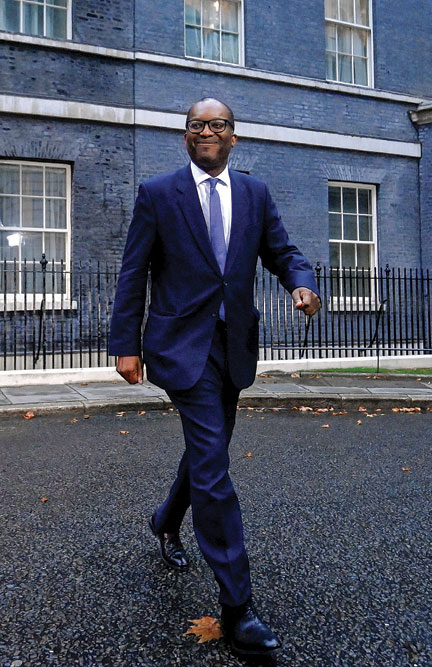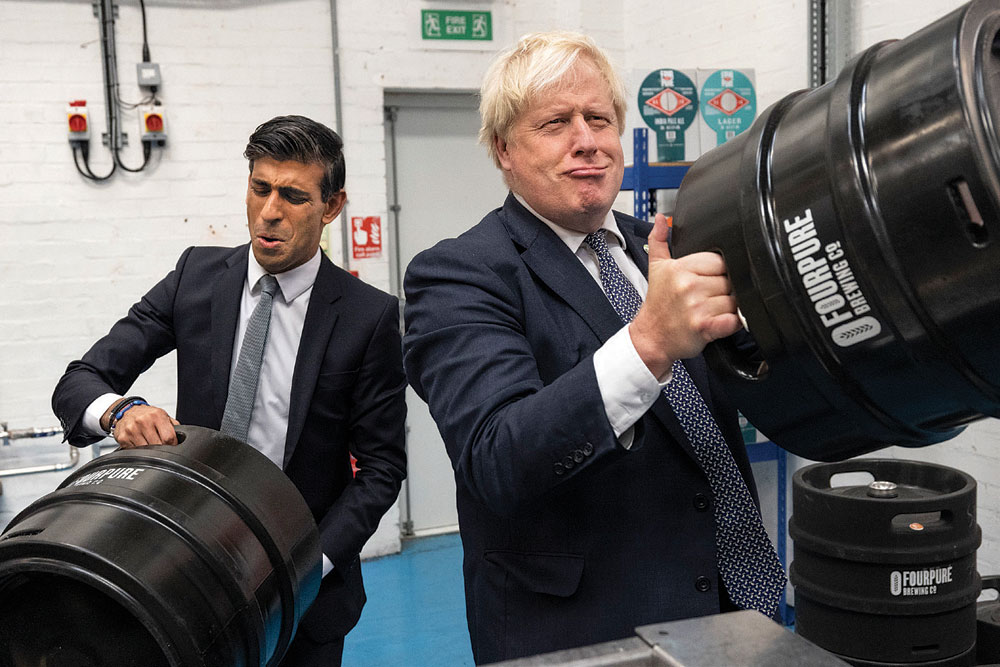A Prayer for Britain
Liz Truss has made a perfect mess of everything in the shortest time possible
 Roderick Matthews
Roderick Matthews
 Roderick Matthews
|
14 Oct, 2022
Roderick Matthews
|
14 Oct, 2022
/wp-content/uploads/2022/10/Britain1.jpg)
British Prime Minister Liz Truss at the Conservative Party’s annual conference, October 5, 2022 (Photo: Getty Images)
WHAT ON EARTH is going on in British politics? Pundits, pollsters and politicians have all been left reeling by a series of extraordinarily un-British events.
Our new Conservative Prime Minister, Liz Truss, has been in the job a little over a month, but has so far managed to crash the pound, destroy her party’s reputation for economic competence, deliver a painful rise in mortgage interest rates, perform several embarrassing U-turns, lose any sense of cabinet discipline, alarm the Bank of England, and give the opposition Labour Party an opinion poll lead that has touched 33 per cent. The press is full of open speculation that Truss will not last until Christmas.
How could it have come to this? The Tories have always valued pragmatism and commonsense. In economic affairs this has meant sound money and budget prudence, and in social issues ‘one nation’ Toryism always recognised that the wealthy carry an obligation to provide for the welfare of the poor. Liz Truss—a liberty-loving advocate of free markets—has binned all these traditions in the shortest time possible.
She was a high-profile, self-proclaimed loyalist to her predecessor, Boris Johnson, throughout his three turbulent years in office. Many Tories considered that Johnson was primarily brought down by the disloyalty of his chancellor of the exchequer, Rishi Sunak, or by a malign media conspiracy led by the BBC, but Liz Truss, who was Johnson’s foreign secretary, remained free of the taint of treachery. In the leadership contest that followed Johnson’s forced resignation, many regarded her as the continuity-Johnson candidate.
She built on this platform over weeks of party hustings by adding a new strand—that she would revive Margaret Thatcher’s small-state, low-tax policies. This galvanised the party membership, and enabled her, after she only scraped into the final ballot as the second choice of Conservative MPs, to outbid Sunak, who was promoting fiscal prudence and the necessity of a cautious approach to the public finances in a time of high inflation. He described Truss’ plans to stimulate the economy by cutting taxes as “a holiday from reality”.
But the grassroots Tory members were in no mood for Sunak’s pessimism. They gave Truss the keys to No 10, and on September 5, 2022, she began her premiership on a tide of optimism. The death of the Queen then interposed, so it was on September 23 that Truss’ new chancellor of the exchequer and long-time ally, Kwasi Kwarteng, stood up in the House of Commons to unveil the new administration’s approach, rapidly dubbed ‘Trussonomics’. And here is where the trouble started.
The first shock was the extent of Kwarteng’s departure from the Johnson years. There were reductions in corporation tax, stamp duty and national insurance, a 1 per cent cut in income tax for low earners, and the abolition of the top 45 per cent tax for high flyers. This was accompanied by the removal of a longstanding cap on bankers’ bonuses. In fiscal terms, it seemed that Kwarteng was giving handouts to the wealthy while, in the midst of a cost-of-living crisis, the poor would get nothing.
Boris Johnson’s colleagues, who eventually felt forced to throw him out, are now suffering an attack of regicide’s remorse as Truss appears to be trashing the possibility of continued conservative rule. Her personal unpopularity is the highest ever recorded for a prime minister, at minus 47 per cent, and national opinion polls show the Labour Party with leads of over 20 per cent
The justification for this glaring inequity was the old ‘trickle-down’ theory; give entrepreneurs extra money, they will create new businesses and the economy will expand. But this is a huge gamble: growth is not a given. The rich could just as well squirrel the extra cash away in offshore accounts or spend it on expensive foreign holidays, or fancy goods produced elsewhere, such as luxury cars or super yachts. This looked like crass economics and tin-eared politics.
Worse, the whole ‘mini-budget’ was not costed in detail by the chancellor himself or by the independent Office for Budget Responsibility (OBC), the body tasked with producing an economic impact assessment of all government measures. Kwarteng had failed to show his workings—how he intended to fill the £45 billion hole in the public finances—and had evaded OBC scrutiny in a way that undermined his credibility. Since then, the markets have judged that the greatest threat to the stability of the British economy is the British government itself, because it seemed to be intending to fund all of the revenue shortfall from increased borrowing, which would, as Rishi Sunak had warned, raise interest rates for everyone.
Here was a government abandoning what Truss had dismissively called “Treasury orthodoxy”, meaning balanced budgets, while announcing unfunded tax cuts, and going for growth in a time of high inflation.
Panic ensued, and within hours the pound had collapsed and was approaching parity with the dollar, while the price of government bonds—gilts—went up along with mortgage interest rates. Truss and Kwarteng held firm; she had declared herself prepared to take unpopular decisions for the good of the country and seemed determined to emulate Thatcher’s fabled ability to stay the course in tough financial times.
By coincidence, the annual Conservative Party Conference fell at exactly this point in the calendar, and unfortunately for Truss she had to quell a back-bench rebellion on the gathering’s first morning by abandoning the abolition of the 45 per cent tax rate. This U-turn opened the floodgates of disloyalty, and the next few days were full of plotting against her and calls for Kwarteng’s head. As yet, he survives, and his long friendship with Truss may still save him. Currently, the Bank of England has swung behind him with heavy intervention in the bond market, but that cannot last indefinitely.
Destructive speculation within the party continues. Can she be guided back into more sensible policy channels? Or, to retain any chance of winning the next general election, due by January 2025 at the latest, is it necessary to oust her immediately? As yet there is no decision.

When Boris Johnson romped home to an 80-seat majority in the 2019 election, people confidently predicted three terms for him. But his colleagues, who eventually felt forced to throw him out, are now suffering an acute attack of regicide’s remorse as Truss appears to be trashing the possibility of continued Conservative rule. Her personal unpopularity is the highest ever recorded for a prime minister, at minus 47 per cent, and national opinion polls consistently show the Labour Party with leads of over 20 per cent.
THE PROSPECTS FOR the Truss revolution do not look good. She always had a reputation for strong-headedness and reluctance to take advice, and she lacks the kind of communication skills that modern politicians require. In this she suffers badly by contrast with her predecessor, who had charisma and humour, and exuded reassurance. Truss, by contrast, has oratorical skills so wooden that her audience risks getting splinters in their ears. She has also shunned the basic political prudence of appointing at least some Sunak supporters to her cabinet; instead, she has pointedly excluded them.
Truss’ new Chancellor of the Exchequer, Kwasi Kwarteng, on September 23 unveiled the new administration’s approach, rapidly dubbed ‘Trussonomics’. And here is where the trouble started. In fiscal terms, it seemed that Kwarteng was giving handouts to the wealthy while, in the midst of a cost-of-living crisis, the poor would get nothing. The justification for this glaring inequity was the old ‘trickle-down’ theory
Things are bad now, her party realises, but even worse may be coming. Truss is promising massive ‘supply side’ interventions, including reforms of childcare provision, residential planning, environmental protection, and employment rights—in sum, anything that she considers to be standing in the way of economic growth.
On the conference platform she announced that her three priorities were “growth, growth and growth”, and that she was determined to defeat what she called “the anti-growth coalition”. This, it turned out, included those who dislike unfunded tax cuts, or are sceptical about supply-side economics, or have ever advocated regulation of anything. So, pretty much everyone, including the International Monetary Fund (IMF). The impression was created of a leader making far too many enemies far too quickly.
To create further alarm, the government’s in-tray is stacked with thorny issues, including rising inflation, rocketing energy prices, the dispute over the Northern Ireland protocol, the war in Ukraine, and the parlous state of the National Health Service (NHS). Can Truss be left in charge of all this? On the evidence of the last few weeks, a very large slice of the Parliamentary Conservative Party, which did not support her wholeheartedly when given the chance, is saying “no”. But to dump her so soon risks making the party a political joke. On the other hand, not to dump her risks turning the party into an electoral cadaver.
And there is a tricky constitutional issue, too.
At the last general election, millions of people voted not for Liz Truss but for Boris Johnson, who stood on a published manifesto. She was then installed by a micro electorate; the Conservative Party membership represents a fraction of 1 per cent of the population, and she only got 57 per cent of them. Truss has come in halfway through the cycle, which is not unprecedented, but whenever this has happened before, the personal style of the government may have changed a little but its fundamental tenor did not. Truss, however, has scrapped Johnson’s manifesto, with its key policy of “levelling up”. Of course, Johnson himself never quite defined that policy, but its general objective—using the levers of government to address regional disparities—is the precise opposite of Truss’ adoption of low regulation, reduced government spending, and a thorough embrace of economic inequality. Where is democratic accountability in this change?
The chickens of Brexit are finally coming home to roost.
The genius of Boris Johnson was to turn the cause of Brexit into anything you wanted it to be. To vote “leave” was to vote for “not this”. Johnson had the political nous to campaign in such an ambiguous style that he made leaving the European Union (EU) seem like the optimistic option. This lay at the heart of his victories in the referendum of 2016 and the election of 2019. He had created a new style of ‘big-tent’ politics.

But the electoral success of the anti-EU coalition relied on an agenda that was not likely to survive contact with government for long, and Truss is paying the price. The only political entity which tried to sell Brexit as party policy—UKIP (The United Kingdom Independence Party)—was never a strong electoral force. There was always “red UKIP”—disgruntled socialists—and “blue UKIP”—nationalist Conservative rebels—and the two never had to be reconciled within a fringe party that was primarily a sump for grievances. In a party of government, however, that tension has produced real problems. Johnson squared this circle by promoting both high public spending and anti-immigration policies, effectively promising to give everybody what they wanted.
Johnson’s tragedy was that it was not his obfuscating doublespeak that did for him; it was a combination of ineptitude and dishonesty which eventually turned his parliamentary colleagues against him. Liz Truss’ tragedy is that she never even considered trying to manage this unstable post-Brexit alliance. She simply ignored the problem, running headlong to the farthest reaches of the Tory right.
Many Tories considered that Johnson was primarily brought down by the disloyalty of his chancellor of the exchequer, Rishi Sunak, or by a malign media conspiracy, but Liz Truss, who was Johnson’s foreign secretary, remained free of the taint of treachery. In the leadership contest that followed, many regarded her as the continuity-Johnson candidate
Truss’ government is determined to see a bonfire of regulations, extra rewards for the super-rich, and the creation of the fabled “Singapore-on-Thames” that was always the dream of the cabal of financiers who called themselves “the bad boys of Brexit”. These self-styled malefactors, who emerged from the British financial services industry, had no interest in any electoral constituency; they simply wanted to be allowed to make more money by any means they saw fit. Liz Truss has been in and around their favourite thinktanks for the last decade. She is, unequivocally, their girl.
Truss never had a sympathetic parliamentary party behind her, and she may well find it hard to carry some of her proposals through the Commons. If she can’t, she will fall. Her support is very narrow within the political world and remains sparse in the country. We are watching an angel dancing upon the head of a very small pin.
The market turbulence is not banished yet, and Truss seems reluctant to address the problems that very obviously surround her. She lacks allies and seems bereft of reliable instincts. Currently, she has neither the trust of her party nor the confidence of the nation.
If you’re looking for an upside, lay some money on Liz Truss being the shortest-serving British prime minister ever.

/wp-content/uploads/2025/07/Cover_Dalai-Lama.jpg)












More Columns
From Entertainment to Baiting Scammers, The Journey of Two YouTubers Madhavankutty Pillai
Siddaramaiah Suggests Vaccine Link in Hassan Deaths, Scientists Push Back Open
‘We build from scratch according to our clients’ requirements and that is the true sense of Make-in-India which we are trying to follow’ Moinak Mitra